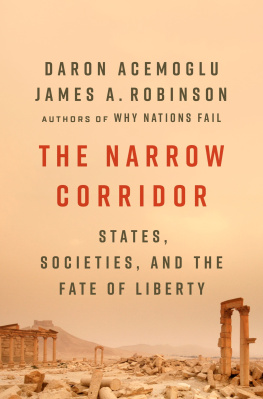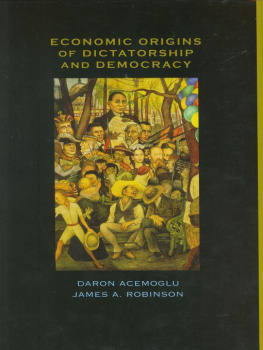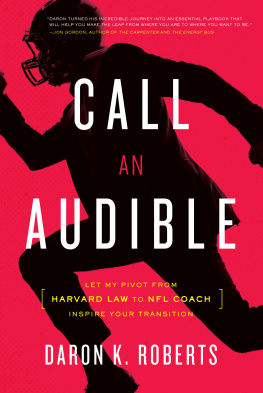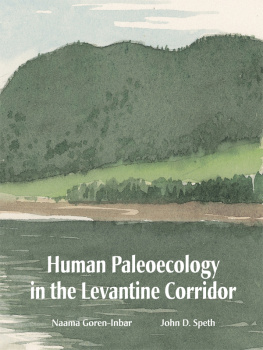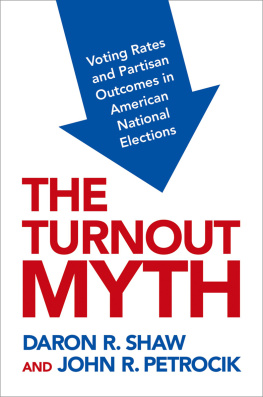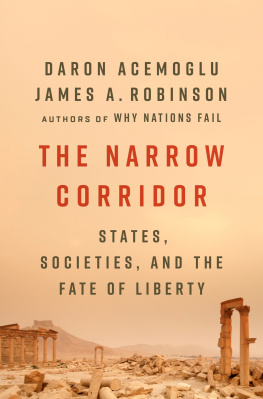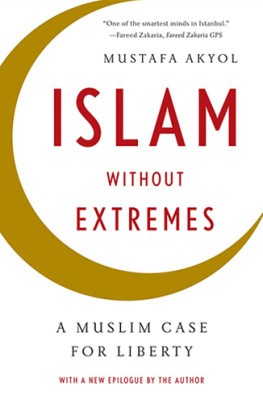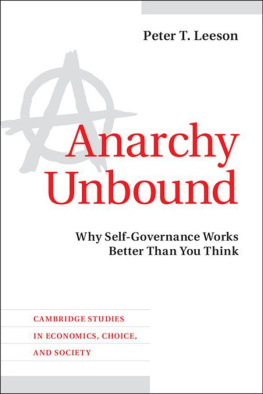Acemoglu Daron - The Narrow Corridor
Here you can read online Acemoglu Daron - The Narrow Corridor full text of the book (entire story) in english for free. Download pdf and epub, get meaning, cover and reviews about this ebook. year: 2019, publisher: Penguin Publishing Group, genre: Politics. Description of the work, (preface) as well as reviews are available. Best literature library LitArk.com created for fans of good reading and offers a wide selection of genres:
Romance novel
Science fiction
Adventure
Detective
Science
History
Home and family
Prose
Art
Politics
Computer
Non-fiction
Religion
Business
Children
Humor
Choose a favorite category and find really read worthwhile books. Enjoy immersion in the world of imagination, feel the emotions of the characters or learn something new for yourself, make an fascinating discovery.
- Book:The Narrow Corridor
- Author:
- Publisher:Penguin Publishing Group
- Genre:
- Year:2019
- Rating:3 / 5
- Favourites:Add to favourites
- Your mark:
- 60
- 1
- 2
- 3
- 4
- 5
The Narrow Corridor: summary, description and annotation
We offer to read an annotation, description, summary or preface (depends on what the author of the book "The Narrow Corridor" wrote himself). If you haven't found the necessary information about the book — write in the comments, we will try to find it.
The Narrow Corridor — read online for free the complete book (whole text) full work
Below is the text of the book, divided by pages. System saving the place of the last page read, allows you to conveniently read the book "The Narrow Corridor" online for free, without having to search again every time where you left off. Put a bookmark, and you can go to the page where you finished reading at any time.
Font size:
Interval:
Bookmark:
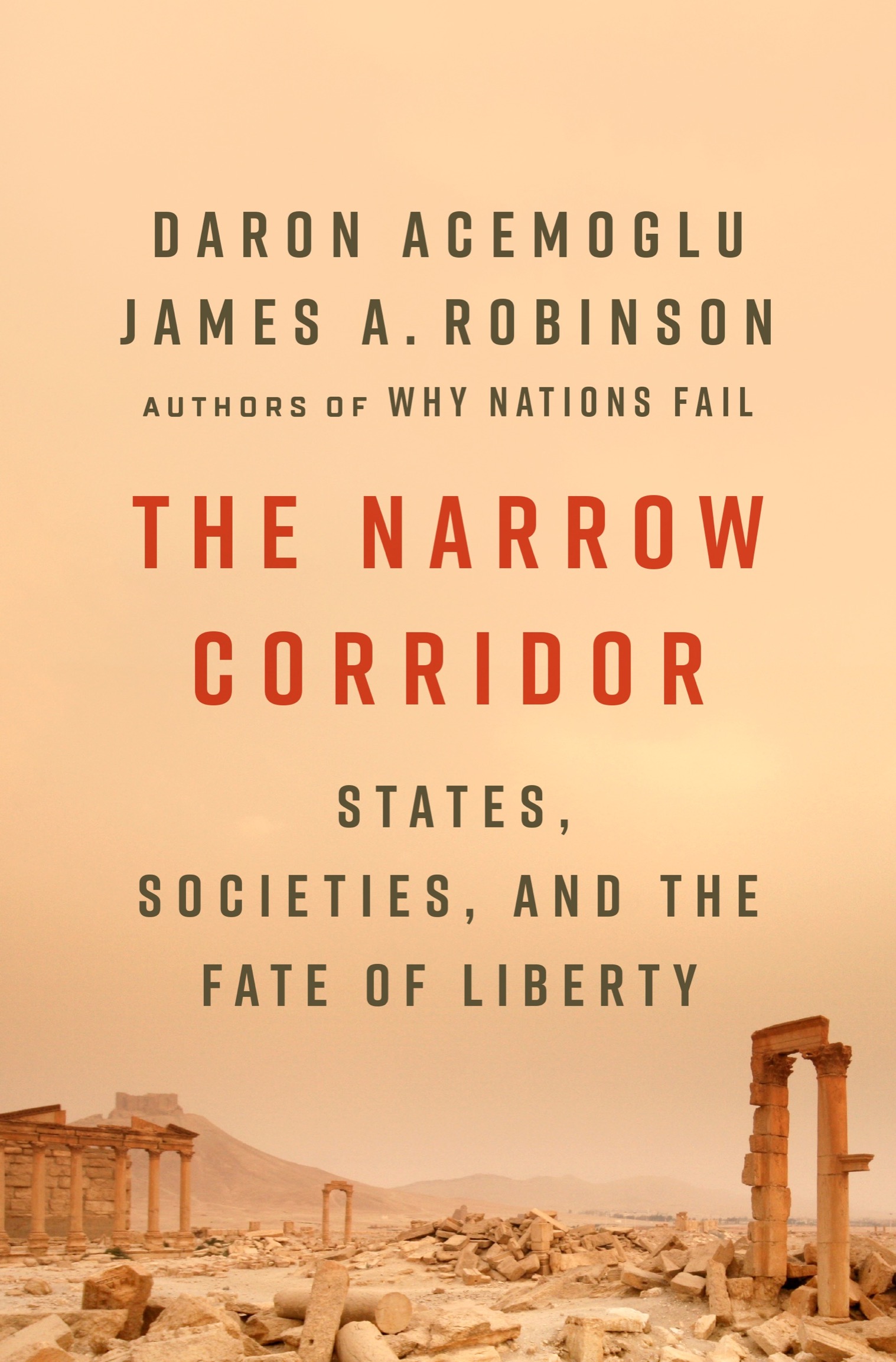
Why Nations Fail
Economic Origins of Dictatorship and Democracy
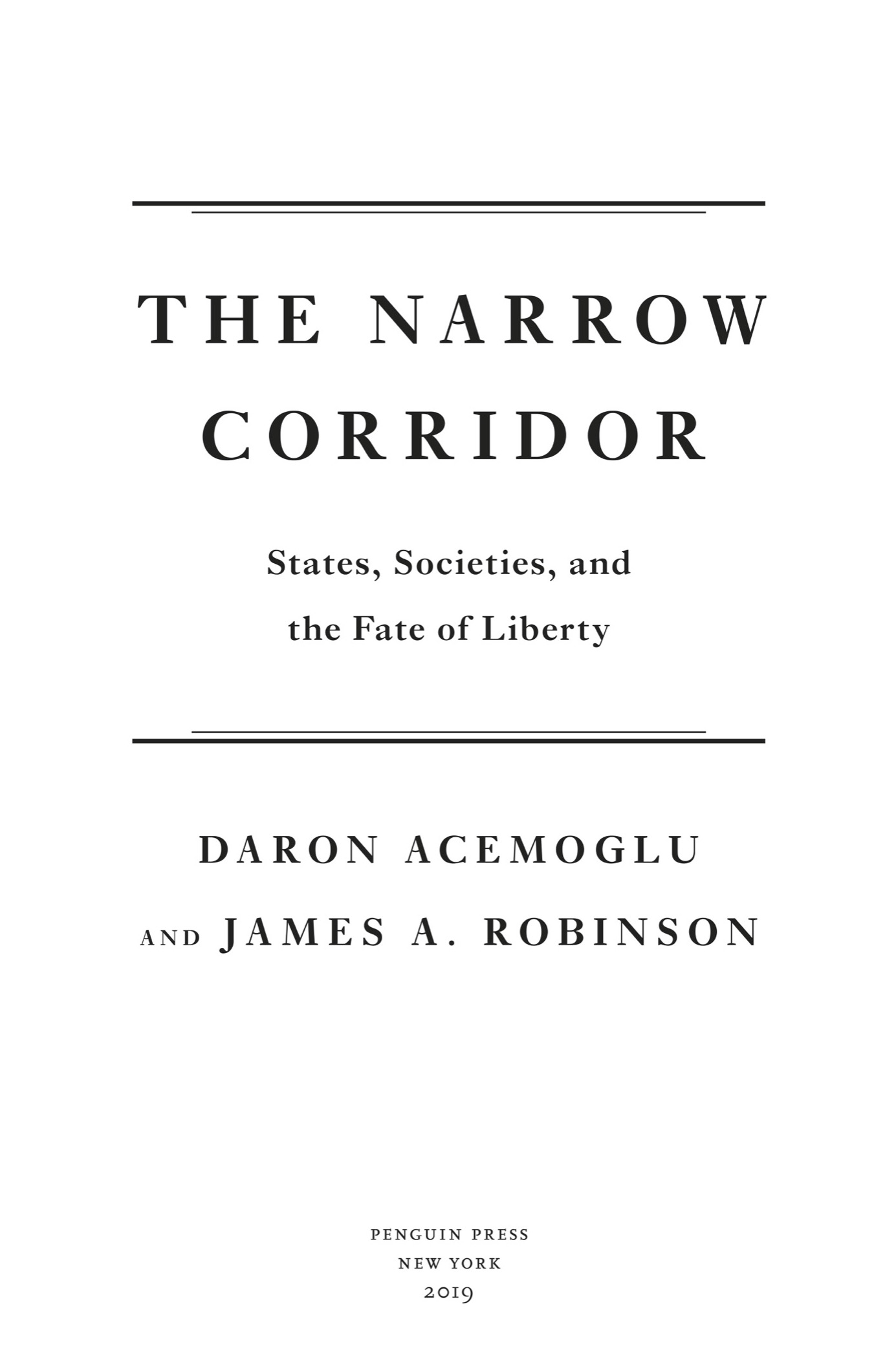
PENGUIN PRESS
An imprint of Penguin Random House LLC
penguinrandomhouse.com
Copyright 2019 by Daron Acemoglu and James A. Robinson
Penguin supports copyright. Copyright fuels creativity, encourages diverse voices, promotes free speech, and creates a vibrant culture. Thank you for buying an authorized edition of this book and for complying with copyright laws by not reproducing, scanning, or distributing any part of it in any form without permission. You are supporting writers and allowing Penguin to continue to publish books for every reader.
constitutes an extension of this copyright page.
Picture research by Toby Greenberg Maps prepared by Carlos Molina and Jose Ignacio Velarde Morales
LIBRARY OF CONGRESS CATALOGING-IN-PUBLICATION DATA
Names: Acemoglu, Daron, author. | Robinson, James A., 1960 author.
Title: The narrow corridor: states, societies, and the fate of liberty / Daron Acemoglu and James A. Robinson.
Description: New York : Penguin Press, 2019. | Includes bibliographical references and index.
Identifiers: LCCN 2019009146 (print) | LCCN 2019981140 (ebook) | ISBN 9780735224384 (hardcover) | ISBN 9780735224391 (ebook) | ISBN 9781984879189 (international/export)
Subjects: LCSH: Liberty. | State, The. | Power (Social sciences)Political aspects. | Direct democracy. | Decentralization in government. | Executive power. | ViolencePolitical aspects.
Classification: LCC JC585 .A188 2019 (print) | LCC JC585 (ebook) | DDC 320.01/1dc23
LC record available at https://lccn.loc.gov/2019009146
LC ebook record available at https://lccn.loc.gov/2019981140
While the authors have made every effort to provide accurate Internet addresses at the time of publication, neither the publisher nor the authors assume any responsibility for errors, or for changes that occur after publication. Further, the publisher does not have any control over and does not assume any responsibility for author or third-party websites or their content.
Cover design: Christopher Brian King
Cover photograph: Joe and Clair Carnegie / Libyan Soup / Getty Images
Version_2
To Arda and Aras, even if this is much less than I owe you. DA
Para Adrin y Tulio. Para m el pasado, para ustedes el futuro. JR
This book is about liberty, and how and why human societies have achieved or failed to achieve it. It is also about the consequences of this, especially for prosperity. Our definition follows the English philosopher John Locke, who argued that people have liberty when they have
perfect freedom to order their actions and dispose of their possessions and persons, as they think fit... without asking leave, or depending upon the will of any other man.
Liberty in this sense is a basic aspiration of all human beings. Locke emphasized that
no one ought to harm another in his life, health, liberty, or possessions.
Yet it is clear that liberty has been rare in history and is rare today. Every year millions of people in the Middle East, Africa, Asia, and Central America flee their homes and risk life and limb in the process, not because they are seeking higher incomes or greater material comfort, but because they are trying to protect themselves and their families from violence and fear.
Philosophers have proposed many definitions of liberty. But at the most fundamental level, as Locke recognized, liberty must start with people being free from violence, intimidation, and other demeaning acts. People must be able to make free choices about their lives and have the means to carry them out without the menace of unreasonable punishment or draconian social sanctions.
In January 2011 in the Hareeqa market in the old city of Damascus, Syria, a spontaneous protest took place against the despotic regime of Bashar al-Assad. Soon afterward in the southern city of Daraa some children wrote The people want the fall of the government on a wall. They were arrested and tortured. A crowd gathered to demand their release, and two people were killed by the police. A mass demonstration erupted that soon spread throughout the country. A lot of the people, it turned out, did want the government to fall. A civil war soon broke out. The state, its military, and its security forces duly disappeared from much of the country. But instead of liberty, Syrians ended up with civil war and uncontrolled violence.
Adam, a media organizer in Latakia, reflected on what happened next:
We thought wed get a present, and what we got was all the evil in the world.
Husayn, a playwright from Aleppo, summed it up:
We never expected that these dark groups would come into Syriathe ones that have taken over the game now.
Foremost among these dark groups was the so-called Islamic State, or what was then known as ISIS, which aimed to create a new Islamic caliphate. In 2014, ISIS took control of the major Syrian city of Raqqa. On the other side of the border in Iraq, they captured the cities of Fallujah, Ramadi, and the historic city of Mosul with its 1.5 million inhabitants. ISIS and many other armed groups filled the stateless void left by the collapse of the Syrian and Iraqi governments with unimaginable cruelty. Beatings, beheadings, and mutilations became commonplace. Abu Firas, a fighter with the Free Syrian Army, described the new normal in Syria:
Its been so long since I heard that someone died from natural causes. In the beginning, one or two people would get killed. Then twenty. Then fifty. Then it became normal. If we lost fifty people, we thought, Thank God, its only fifty! I cant sleep without the sound of bombs or bullets. Its like something is missing.
Amin, a physical therapist from Aleppo, remembered:
One of the other guys called his girlfriend and said Sweetheart, Im out of minutes on my phone. Ill call you back on Amins phone. After a while she called asking about him, and I told her hed been killed. She cried and my friends said, Why did you tell her that? I said, Because thats what happened. Its normal. He died.... Id open my phone and look at my contacts and only one or two were still alive. They told us, If someone dies, dont delete his number. Just change his name to Martyr.... So Id open my contact list and it was all Martyr, Martyr, Martyr.
The collapse of the Syrian state created a humanitarian disaster of enormous proportions. Out of a population of about 18 million before the war, as many as 500,000 Syrians are estimated to have lost their lives. Over 6 million have been internally displaced and 5 million have fled the country and are currently living as refugees.
The calamity unleashed by the collapse of the Syrian state is not surprising. Philosophers and social scientists have long maintained that you need a state to resolve conflicts, enforce laws, and contain violence. As Locke puts it:
Where there is no law there is no freedom.
Yet Syrians had started protesting to gain some freedoms from Assads autocratic regime. As Adam ruefully recalled:
Ironically, we went out in demonstrations to eradicate corruption and criminal behavior and evil and hurting people. And weve ended up with results that hurt many more people.
Font size:
Interval:
Bookmark:
Similar books «The Narrow Corridor»
Look at similar books to The Narrow Corridor. We have selected literature similar in name and meaning in the hope of providing readers with more options to find new, interesting, not yet read works.
Discussion, reviews of the book The Narrow Corridor and just readers' own opinions. Leave your comments, write what you think about the work, its meaning or the main characters. Specify what exactly you liked and what you didn't like, and why you think so.

